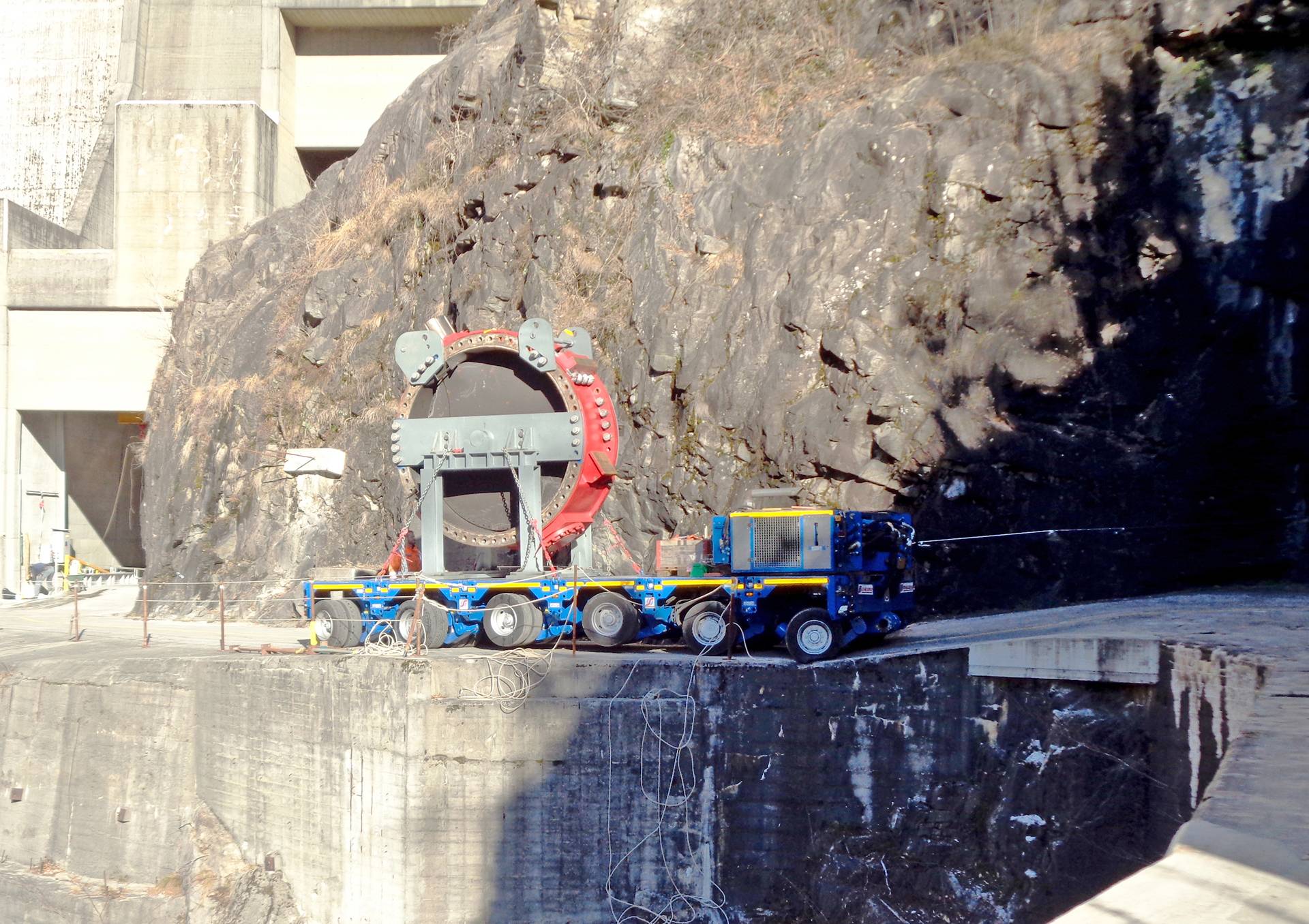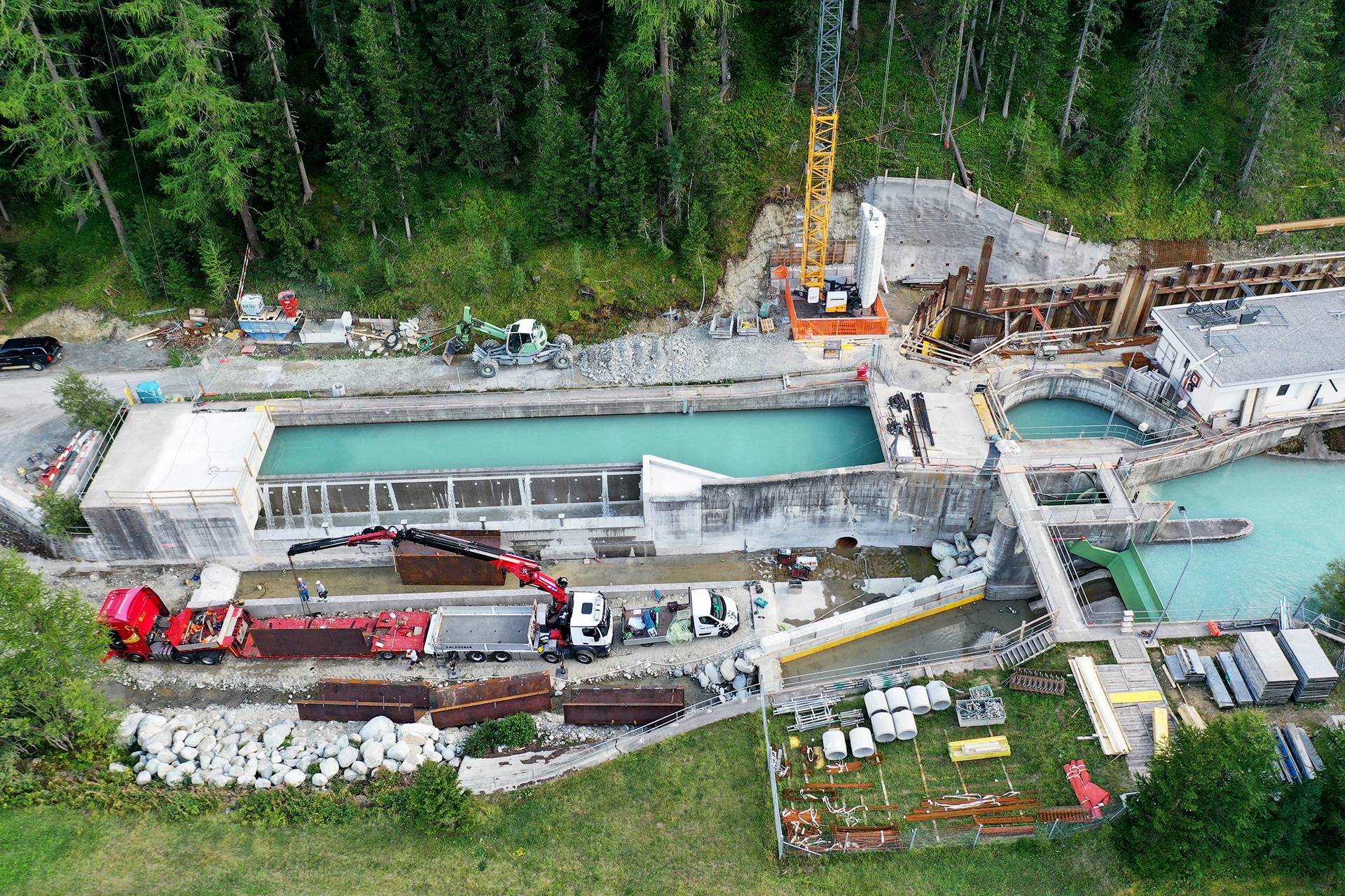TRM ductile iron pipe systems – a product of practised sustainability7 min read
Lesedauer: 5 MinutenSustainability is not a characteristic, but an attitude. Here at the long-established Tiroler Rohre GmbH, they are conscious of this and continue to abide by a strict sustainability strategy.
It starts as early as the production phase, in which scrap metal makes up 100% of the raw materials used, harnesses energy produced by renewable means and even covers the use of by-products accrued during production. Optimisations are made on a continuous basis as part of a comprehensive energy management system. A research project is currently underway to investigate whether metallurgical coke – hitherto an essential element in steel production – could at least in part be replaced by Tyrolean charcoal. This would be a fantastic milestone. In Hall, they are never content to accept the status quo.
At the facility of Tiroler Rohre GmbH (TRM) in Hall in Tirol, high-quality pipe and pile systems made of ductile iron are manufactured for the water industry and deep foundations. The products of Tiroler Rohre GmbH have been proving their worth on European markets and all over the world since 1947. In line with its mission statement, TRM consistently focusses on quality, safety, mutual trust and respect. Particular significance is attached to its sustainability strategy, which is practised by the traditional company with no ifs or buts. “Fundamentally, the sustainability of our product comes down to its nature and is a matter of great importance for us,” explains Harald Tschenett, Director of Production. He points to the fact that 100% of the materials used to produce the pipe and pile systems are recycled. Between 40,000 and 45,000 tonnes of scrap iron passes through the smelter at the facility in Hall each year. The required scrap metal does not travel long distances either, being sourced and delivered by a regional company operating in the local area. The mode of transport similarly contributes to the small environmental footprint: TRM has its own railway siding, meaning the scrap metal wagons can roll right up to the scrap hall. Here the material is picked up by a powerful magnet and taken for processing.
PRUDENT USE OF RESOURCES
Ductile iron pipe and pile systems made by TRM can be viewed as part of a cyclical process. “We obviously melt down old pipes too, irrespective of whether they are grey cast or ductile iron. In each case we end up with high-quality ductile iron, which could just as easily be used to make an engine block,” says Harald Tschenett, clarifying why every old cast iron pipe contains the basis for a new one. As much emphasis is placed on the prudent use of resources at TRM as is placed on conserving the environment. As a result, our exhaust air treatment process is permanently kept up-to-date and the waste water required for the production process is fed into a cycle, at the end of which it is filtered and cleaned by modern filter systems. “We moreover attach great importance to noise control. In order to minimise exposure for our neighbours, the entire factory site is surrounded by a tall noise barrier,” observes company spokesman Christof Mairinger.
WASTE HEAT WARMS TYROLEAN HOUSEHOLDS
One by-product of smelting iron is the waste heat that is released, which also represents a valuable energy resource. “Our waste heat is fed into the Wattens-Hall-Innsbruck district heating system. It can be harnessed to provide thermal energy for 650 households,” explains Harald Tschenett. Using the waste heat from the smelting process saves around 3,100 tonnes of CO2 annually. This equates to the exhaust emissions of roughly 7,200 empty articulated lorries that cover the stretch between Hall and Vienna. Another by-product that emerges from the furnace is slag. This too is recycled: it is used as a raw material by Tyrolean cement producers. The importance attributed to renewable energy by TRM is demonstrated by the firm’s own photovoltaic system. “With a panel surface area of 9.000m2, our facility boasts the largest PV system in the Tyrol. It produces an output of 851 kWp,” according to Christof Mairinger. At least some 300 households in the region can be supplied with the green energy that we feed into the grid. The PV system still only covers part of the roof of the facility.
LONG-LASTING IS SUSTAINABLE
In an age when the catchword “planned obsolescence” is sometimes heard in conjunction with industrial products, the longevity of pipe and pile systems made by TRM remains one of the most important quality criteria of them all. Ultimately the longevity of a product equates to its sustainability, as Christof Mairinger confirms: “if a pipe system is designed to last for 100 years, then its sustainability compared with other systems is a distinct advantage, especially given the uncertainty over whether it can be recycled.” Director of Production Harald Tschenett adds that the knock-on effects should also be taken into account: “we must not forget the investment required in terms of machinery and equipment as well as the logistical and financial aspects when streets have to be ripped up because of defective or obsolete pipelines. At this point the question must be raised as to whether an inexpensive solution really is sustainable too. In relation to this point, any pipe system for which a 100-year service life is the rule rather than exception has huge benefits where sustainability is concerned.
EMPLOYEES: OUR GREATEST ASSET
The issue of sustainability also shines through in TRM’s company culture. We are not only aware that our employees are our greatest asset – it shapes how we operate too. TRM values and practises open and honest communication. No wonder, then, that our members of staff identify strongly with the company. “Employee loyalty is our number one priority. On average, our members of staff stay with us for around 14 years. Due to the relative low staff turnover, the company is able to retain the know-how of its employees. To this end we train our workforce ourselves at our facility. We are a government-certified training organisation,” explains Christof Mairinger. TRM furthermore supports its employees with their further training. It is not without reason that the company has a reputation as one of the best employers in the region.
TYROLEAN CHARCOAL INSTEAD OF COKE?
Persisting with the status quo would be a regression, Harald Tschenett believes. He is referring to the development work that happens at every level. “We have a very efficient energy management system: all of the energy data that it produces are continuously managed and monitored. If we spot the potential to make an improvement, we try to make the most of that too,” explains Harald Tschenett, highlighting a new research project at the Hall factory in which Tyrolean charcoal is used instead of metallurgical coke. “We use metallurgical coke as an energy source and a metallurgical ingredient in the smelting process, and we source it principally from Italy and Poland. This has been indispensable until now. The addition of Tyrolean charcoal could represent a further step towards increased sustainability. The project is at present still only in an early research phase, however. It would therefore be premature to declare this as a new milestone.”
RESPONSIBILITY TOWARDS THE ENVIRONMENT
Tiroler Rohre GmbH’s approach to sustainability is firmly anchored in the company philosophy. The production process for its pipe and pile systems is based on the environmental management system certification in accordance with Standard ISO 14001. This is the most widely recognised international standard for environmental management system, which proves that the producing company is making an active effort to minimise the environmental impacts of its processes, products and services. TRM is also one of the first ductile iron pipe and pile manufacturers to possess an “Environmental Product Declaration”, or EPD for short. This certification gives quantifiable environmental information about the life cycle of a product in order to facilitate comparisons with similar products. Environmental and energy management have steadily increased in importance at TRM over the last few years. They are part of a modern mission statement that is moving forward with full awareness of its responsibility towards the environment and future generations.
Share:


